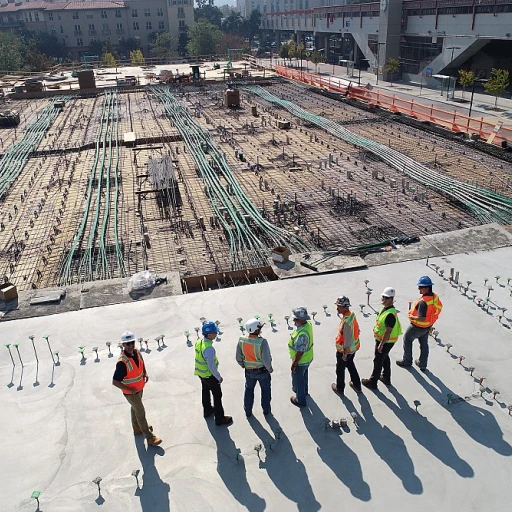Understanding Healthcare Automation
Exploring the Transformation of Healthcare
As the healthcare industry undergoes a significant transformation, healthcare automation emerges as a key driver. This revolution is being fueled by a suite of cutting-edge technologies, from robotic process automation (RPA) to advanced patient management systems. These developments are not just about improving efficiency; they are fundamentally reshaping patient care and medical billing processes.
The integration of automation in healthcare is a multifaceted journey. With the adoption of intelligent solutions, the healthcare sector is starting to see major changes in data management, revenue cycle, and patient eligibility assessments. Such technological advancements streamline operations, enhancing the overall presentation of healthcare services.
Moreover, automation in medical environments links closely with connected care systems, making patient data seamlessly accessible across various platforms. This transformation is not without its challenges, yet the promise of processes made more efficient and cost-effective remains a cornerstone of the automation revolution.
Turning to robotic process automation, it offers transformative potential across various facets of healthcare, particularly in routine tasks such as medical billing and cycle management. This shift is pivotal in addressing some of the key limitations of traditional healthcare systems.
At the heart of this technological shift is the ongoing quest to harness data through technology platforms, both for improving operational efficiency and enhancing patient outcomes. The process automation wave holds the promise of drastically transforming healthcare systems as we know them, although it requires conscientious navigation of existing industry dynamics.
The continued push towards healthcare automation is creating ripples across the sector, as providers adapt to innovations and integrate systems that promise to revolutionize the future of patient care. To gain further insights into this transformative era, visit our detailed discussion on automation's impact on work.
Benefits of Automation in Healthcare
Embracing Technological Benefits in Patient Care
Automation in the healthcare industry is indeed revolutionizing the field, bringing forth a plethora of benefits that are transforming how care is provided. Thanks to advancements such as robotic process automation (RPA) and artificial intelligence, healthcare providers can now streamline complex operational tasks, thereby enhancing overall efficiency and accuracy.
One significant advantage is the optimization of medical billing and revenue cycle management. Process automation helps in reducing errors that commonly occur in billing, ensuring more accurate claims submissions and faster reimbursements. By automating these repetitive tasks, healthcare facilities can significantly cut down administrative costs and redirect efforts to more critical areas of patient care.
Further, automation is improving patient eligibility checks and management processes. Automated systems rapidly process large amounts of data, verifying patient information efficiently, thus reducing wait times and improving patient experiences. These systems also ensure that the necessary information is readily available to healthcare professionals, aiding in timely and informed decision-making.
Another area of benefit is the seamless integration of automated systems with existing healthcare systems to ensure connected care. This leads to better data management and analysis capabilities, which are crucial in the era of personalized medicine. Solutions such as intelligent automation enhance the ability to monitor health trends and manage health risks more proactively.
Moreover, the use of slides and presentations for medical training and patient education is also evolving. Platforms like Google Slides combined with healthcare-specific automation software can help create more informative and engaging healthcare ppt presentations, further enhancing educational efforts.
The future of healthcare automation holds potential for even more transformative changes. For more insights into the power of work automation, visit this article to explore how automation is shaping healthcare and other industries.
Challenges and Concerns
Addressing the Complexities of Healthcare Automation
As automation continues to revolutionize the healthcare industry, several challenges and concerns arise that need careful consideration. While the benefits are substantial, the integration of automation in healthcare systems presents a multifaceted dilemma that healthcare providers must navigate.
Data Privacy and Security
One of the primary concerns is the security of patient data. With the increasing use of automation healthcare systems, there is a significant amount of sensitive data being processed. Ensuring the privacy and security of this data is crucial. Healthcare providers must implement robust security measures to protect against breaches and unauthorized access.
Integration and Interoperability
Integrating new automation solutions into existing healthcare systems can be challenging. Many healthcare facilities operate with legacy systems that may not be compatible with modern technologies. Achieving seamless interoperability between different systems is essential for effective patient care and cycle management.
Job Displacement Concerns
The introduction of robotic process automation (RPA) and intelligent automation raises concerns about job displacement. While automation can handle repetitive tasks such as medical billing and revenue cycle management, there is anxiety about its impact on employment within the healthcare sector. It's important to focus on retraining and upskilling the workforce to adapt to these changes.
Technological Dependence
As healthcare systems become increasingly reliant on technology, there is a risk of over-dependence. Healthcare providers must ensure that they maintain a balance between technological and human elements in patient care. This balance is crucial to prevent disruptions in care delivery in case of system failures.
In conclusion, while automation offers transformative potential for the healthcare industry, addressing these challenges is vital for its successful implementation. For more insights into how technology is enhancing workplace efficiency, explore this resource.
The Role of AI and Machine Learning
The Interplay of AI, Machine Learning, and Automation in Healthcare
Artificial intelligence (AI) and machine learning are playing a transformative role in the healthcare industry, particularly in the realm of healthcare automation. These technologies enhance the capabilities of medical systems by processing vast amounts of healthcare data, resulting in optimized patient care and efficient healthcare management. AI algorithms, for instance, analyze patient data to predict health trends and customize care plans, contributing to a more personalized form of connected care. Machine learning applications in the healthcare system can forecast patient needs and ensure timely medical interventions, thus improving the quality of patient care while also reducing costs. Process automation in healthcare, powered by AI, facilitates tasks such as managing patient eligibility and revenue cycle management. Robotic Process Automation (RPA) is at the forefront, revolutionizing healthcare operations by automating mundane medical billing tasks. This ensures healthcare providers can focus more on direct patient interaction and less on back-end processes. Intelligent automation tools, like those developed for medical billing and data management, streamline operations, thereby enhancing the efficiency and accuracy of healthcare solutions. With technology automating routine tasks, healthcare personnel are empowered to engage more deeply with their patients. The revolutionary impact of AI and machine learning extends to healthcare trends, where automation systems present new frontiers for advanced healthcare solutions. By utilizing RPA healthcare and software technologies, the healthcare industry is continually evolving, promising a future where healthcare systems function more effectively and patients receive care that is timely and precise. This intersection of AI, machine learning, and automation is not just a futuristic concept but a present reality that is redefining the landscape of healthcare, optimizing both management and delivery of care.The Future Workforce in Healthcare
Adapting to a New Workforce Reality
As automation continues to revolutionize healthcare, the industry must confront the emerging challenges and opportunities that come with a technologically advanced workforce. Automation, through tools like robotic process automation (RPA) and intelligent systems, is streamlining patient care, medical billing, and data management, which impacts roles traditionally held by human workers. Healthcare providers now find themselves navigating a transformed landscape where process automation demands new skills and approaches. As the need for manual tasks diminishes, there is a growing emphasis on understanding and managing sophisticated technology and systems. Professionals must adapt to the integration of AI and machine learning solutions, which are becoming increasingly critical in delivering efficient healthcare services and connected care. For healthcare organizations, this shift calls for strategic planning to retrain and reskill staff. Empowering employees with knowledge on advanced healthcare automation systems and software will be key to sustaining a competent workforce. Just like in traditional patient care, continuous education and training in technology-driven advancements will ensure that healthcare providers remain at the forefront of the industry. Moreover, the transition won't solely sideline current employees but will also open doors for new positions focused on managing and enhancing automated processes. As the healthcare industry embraces digital transformation, there will be an increased demand for experts skilled in RPA healthcare, patient eligibility analysis, and cycle management among others. In this evolving environment, creating a synergy between humans and machines will define the future of work in healthcare. Collaborative work between human oversight and intelligent automation promises to optimize efficiency, enhance patient experiences, and harness the full potential of technological innovations.Preparing for the Future
Equipping the Workforce for Tomorrow
In the ever-evolving landscape of healthcare automation, preparing the workforce for future challenges is crucial. As intelligent automation and robotic process automation (RPA) take center stage, healthcare professionals must be adept at using and managing these advanced systems. Training programs tailored to the healthcare industry are essential in building expertise in areas such as medical billing software, data management, and patient care systems. To foster a smooth transition to automation healthcare solutions, healthcare providers should focus on:- Emphasizing Continuous Learning: Encourage the development of skills crucial for operating new technologies, such as RPA and artificial intelligence. This should include understanding how automation revolutionizes revenue cycle management and patient care processes.
- Adapting to New Roles: Healthcare professionals will need to shift from traditional responsibilities to more tech-savvy roles that involve oversight of automated systems. This transition requires a flexibility and willingness to adapt.
- Collaborative Approach: Interdisciplinary teams involving IT specialists, medical staff, and administrative personnel can help in effectively implementing automated solutions that ensure connected care.
- Investing in Technology Education: Healthcare providers should offer resources such as healthcare ppt presentations and google slides to aid in understanding and integrating automation technologies.







